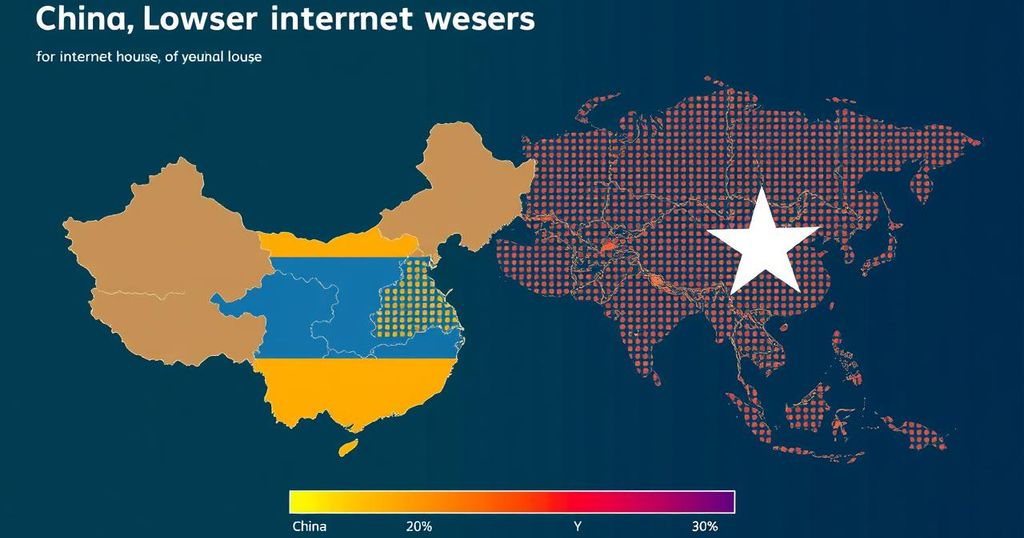Declining Internet Freedoms: A Global Perspective on Digital Rights in 2023
A Freedom House report indicates that China and Myanmar are tied for the lowest ranking in internet freedom globally, as digital freedoms continue to decline for the 14th year. The report emphasizes the importance of a free internet for democracy, particularly in light of numerous elections occurring in 2024. It highlights the restricting measures taken by various governments against online speech and information, while also noting some improvements in countries such as Zambia.
According to a recent Freedom House report, China and Myanmar now share the distinction of having the worst internet freedom conditions globally. This marks the fourteenth consecutive year of a decline in digital freedoms across the globe. As Kian Vesteinsson, the report’s co-author, indicated, this deterioration in internet freedom is particularly concerning given the number of national elections scheduled for 2024. “A free and open internet is critical for a well-functioning democracy in the 21st century…” he stated, emphasizing the challenges voters face in accessing accurate information online. The Freedom on the Net report reviewed 72 countries, which represent approximately 87% of global internet users. Among these, 41 nations are poised to hold elections this year. In a troubling trend, the report revealed that 25 of these countries have implemented measures such as blocking websites, limiting access to social media, or entirely severing internet connections, often accompanied by manipulation of online content to mislead voters. The report also indicates a troubling rise in violent attacks and arrests aimed at stifling online speech. The identified measures against internet freedoms intensified as elections approached, leading to a chilling effect on political discourse. Meanwhile, notable improvements were recorded in 18 countries, with Iceland retaining its status as the leading nation for internet freedom. In contrast, the report highlights a decline in online freedoms for 27 countries, marking a significant downturn in internet liberties globally. This year, China and Myanmar have achieved the lowest score for online freedoms, a first for any country in nearly a decade, according to the findings. Vesteinsson pointed out that Myanmar’s internet freedoms have regressed sharply since the military seized power in 2021, employing tactics such as the blocking of independent news and widespread internet shutdowns. “This is a story of how the military has launched measure after measure…” Vesteinsson noted. Interestingly, while these two nations share this undesirable ranking, Vesteinsson explained that the experiences of citizens differ significantly. China has endured systematic censorship for many years, whereas the people of Myanmar are still acclimatizing to their new regime of online suppression. “It takes time for these repressive measures to shape people’s ability and capacity to express themselves freely,” he remarked. Moreover, Kyrgyzstan has been singled out for the most significant decline in internet freedoms due to legislative measures aimed at consolidating power within the presidency. Other countries that experienced substantial decreases in internet freedoms included Azerbaijan, Belarus, Iraq, and Zimbabwe. Conversely, Zambia emerged as a notable success story, demonstrating an improvement in internet freedoms post-2021 elections despite ongoing challenges regarding governmental censorship. Advocacy efforts by civil society groups in Zambia have played a crucial role in fostering these advancements in online liberties, with Vesteinsson commenting that these efforts are facilitating positive change in the country.
The Freedom House report, “Freedom on the Net,” assesses the state of internet freedom worldwide, highlighting trends, challenges, and measures affecting online rights and accessibility. The report investigates various nations, detailing how political contexts, especially during electoral periods, impact digital freedoms. The findings underscore the importance of internet access for democracy, particularly as many countries prepare for national elections in 2024. The report also reflects on specific instances of detrimental policies enacted by governments against free online discourse and the contrasting developments in certain nations, showcasing both repression and progress.
In summary, the 2023 Freedom House report reveals a concerning global trend of declining internet freedom, with China and Myanmar ranked as the least free online environments. The report illustrates the challenges posed by government restrictions on digital freedoms, particularly in the context of upcoming elections. However, it also highlights some positive strides in specific countries like Zambia, where civil society initiatives are enhancing internet freedoms. The overall landscape remains precarious, with ongoing calls for enhanced protections for online rights worldwide.
Original Source: www.voanews.com







Post Comment